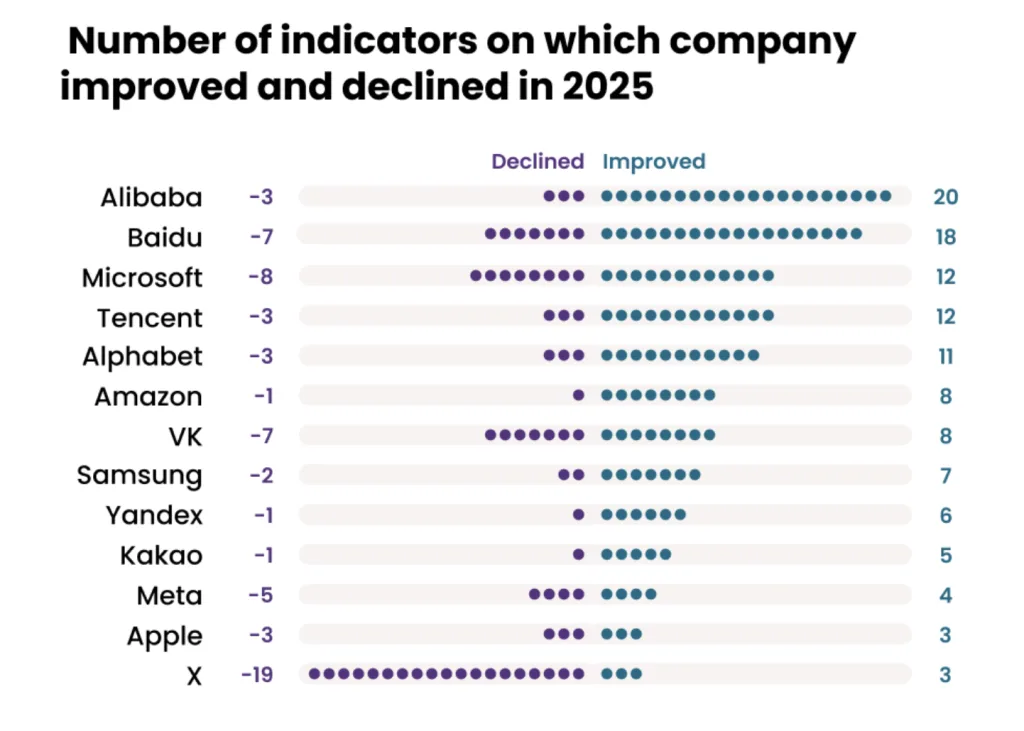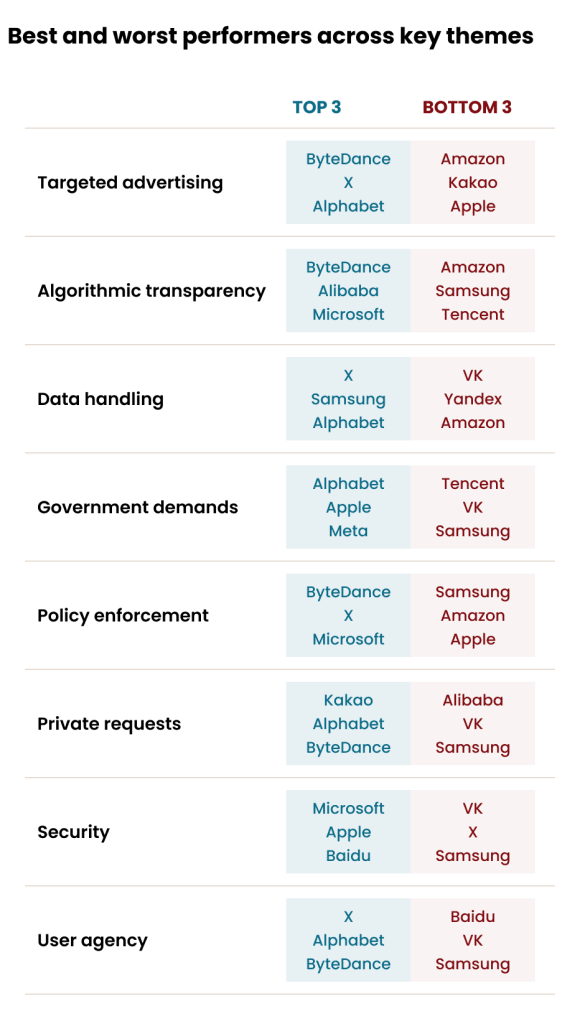U.S. tech firms earn dismal grades on human rights report card

This story originally appeared in Global Voices.
A decade after the first assessment, the 2025 Ranking Digital Rights Index: Big Tech Edition reveals a landscape of paradox. While some of the world’s most influential digital platforms demonstrate incremental improvements in transparency, particularly in governance disclosures from Chinese companies like Alibaba, Baidu, and Tencent, the overall picture suggests a concerning inertia. In a world grappling with rising authoritarianism, the use of AI tools, and ongoing global conflicts, the report shows that many Big Tech companies are largely continuing with “business as usual,” failing to address critical issues.
The concentration of power within Big Tech remains a central concern. The report highlights how companies like Alphabet, Amazon, Apple, Meta, and Microsoft have aggressively acquired competitors, consolidating their dominance in the digital landscape. This market concentration, where Alphabet, Meta, and Amazon capture two-thirds of online advertising revenue, grants them power over online access and information flows.
Despite increasing scrutiny from legal systems, evidenced by rulings against Google for illegal monopolies in search and advertising, the political influence of Big Tech appears to have increased. The symbolic image of US Big Tech CEOs in the front row of the presidential inauguration underscores their deep connections with government bodies, potentially hindering much-needed oversight at a time when human rights and democratic structures face unprecedented challenges globally.
This dominance is further exacerbated in a context of conflict. “Alphabet, Amazon, and Microsoft have all developed tools meant for war and integration with lethal weapons. Their cloud infrastructure has powered military campaigns,” reveals the report. Ranking Digital Rights also calls attention to propaganda, especially on X and platforms owned by Meta.
Lack of transparency
While the report highlights pockets of progress, particularly among Chinese companies (Alibaba, Tencent, and Baidu), showing increased transparency in governance, patterns have been spotted throughout the analysis that raise concerns. Though Meta has shown improvements in disclosing how its algorithms curate content and has enhanced security with default end-to-end encryption on some messaging services, significant shortcomings persist across the industry. A common issue is the widespread lack of transparency in how companies handle private requests for user data or content restrictions, with Samsung notably disclosing no information in this area.

The very engines of Big Tech’s profit—algorithms and targeted advertising—remain largely opaque. Despite the known risks for democracies linked to disinformation and election interference, none of the assessed companies achieved even half the possible score in this area. Alphabet and Meta even showed slight declines in transparency related to their targeted advertising practices. Most companies fail to disclose information about advertisements removed for violating their policies or provide evidence of enforcing their ad targeting rules.
X declined significantly more than other companies analyzed. “The company’s transformation from the publicly listed Twitter to the privately held X Corp. and the elimination of its human rights team coincided with a significant drop in transparency across its governance, freedom of expression, and privacy practices,” the report emphasized. X failed to publish a transparency report in both 2022 and 2023. While a report finally surfaced in September 2024, it fell outside the assessment’s cutoff. Even more troubling is the reported removal of years’ worth of transparency reports dating back to 2011.

Finally, the report points to a troubling pattern of policy evolution. Companies like Meta and YouTube have been revising their content policies in ways that have sparked widespread concern, such as Meta dismantling its third-party fact-checking program in the US and YouTube removing “gender identity” from its hate speech policy. Global Voices covered the consequences of this policy in Africa, and also how fact-checking practices are needed amidst digital authoritarianism, especially during elections, such as the case of Indonesia.
This suggests a potential shift towards justifying existing behaviors rather than upholding previously embraced principles.
The 2025 RDR Index demonstrates stagnation at a critical time. While acknowledging some positive developments, the report also calls for a renewed effort from different stakeholders, especially civil society, investors, and policymakers.
What's Your Reaction?
 Like
0
Like
0
 Dislike
0
Dislike
0
 Love
0
Love
0
 Funny
0
Funny
0
 Angry
0
Angry
0
 Sad
0
Sad
0
 Wow
0
Wow
0






























































































